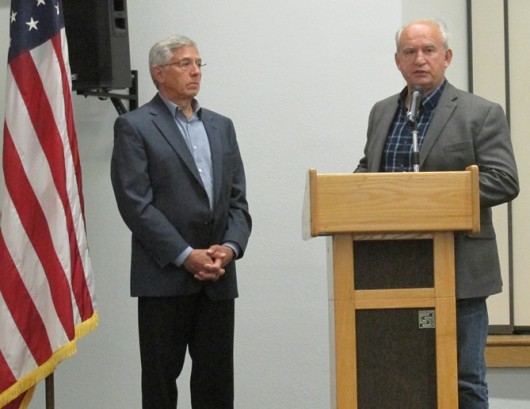
Alaska Lt. Gov. Byron Mallott, left, and BC Minister of Mines Bill Bennett address the Alaska Power Association Thursday morning in Ketchikan. They later talked to the Ketchikan Chamber of Commerce. (Photo by Leila Kheiry)
British Columbia’s Minister of Mines Bill Bennett was in Ketchikan on Thursday, part of a diplomatic and fact-finding trip to Southeast Alaska related to the issue of transboundary mines.
Many Southeast residents, especially tribal groups and fishermen, are concerned about the potential effects B.C. mines could have on Alaska. The primary concern is over tailings – mine waste – upstream of salmon habitat.
Bennett spoke to a packed Ketchikan Chamber of Commerce crowd, and said he’s a small-town kind of person, and can relate to the people who live in Southeast. Bennett said he understands the passion people feel for this region, and for the health of salmon runs.
“The salmon are so central to the culture, starting, obviously, with indigenous people who have been here from time immemorial, but including those of you who came later,” he said. “It wouldn’t be the place that it is without the salmon that you have. The commercial fishing industry, the sportfishing industry, the cruise line industry, you can see how important that is to the economy here today.”
Bennettsaid he knew all that on an intellectual level previously, but now he understands better on an emotional level, too. While they’ve not figured everything out quite yet, he said there’s been a lot of progress.
Bennett has been working toward an agreement between the Canadian province and Alaska’s state government with Alaska Lt. Gov. Byron Mallott, who introduced Bennett to the Chamber audience. Mallott said that over the past few days, they’ve developed a cordial working relationship.
“The visits have thus far been very productive. They have strengthened the relationship between our two sovereign entities,” he said. “Meeting with stakeholders that have huge involvement and interest in what happens on those three rivers.”
The three rivers are the Unuk, the Taku and the Stikine, all flowing into Alaska from British Columbia, and all with mine sites, or potential mines, on the Canada side of the border.
Bennett said he knows Alaska is at risk, with no real benefit from the Canadian mining activity. But, he assured the group, Canadians do care what happens to Alaska, and as mines are developed in the province, want to keep the state in the loop. And not just state officials, either.
“We have heard loud and clear that many interests in Southeast Alaska, starting with the tribes, will not be satisfied if only the State of Alaska has that opportunity,” he said. “Therefore, we’ve had subsequent discussions about how we can involve third-party interests in our processes, not just to get information but also to be heard.”
Bennett addressed the Mount Polley mine tailings breach, which has been held up as an example of Canada’s regulatory failings. He agrees that there were mistakes made, and the situation could have been much worse if it had been an acid-generating mine.
“I’m not here to say don’t worry, be happy, everything is great, we’re wonderful, we never make mistakes because you know we do,” he said. “We had a huge mistake last year at Mount Polley, but we are responsible. We do a good job. Our standards and our processes are more or less the same as Alaska, is what the state folks have told us. So, we don’t have low standards and we do care not only about our environment , but we care about yours, and that’s the central message I have.”
Ketchikan was Bennett’s last stop in Alaska before heading back to Canada. During his visit, he met with tribal leaders and other stakeholders, and toured the Taku River.
We have earlier reports from Bennett’s visit to the Juneau area posted under “Southeast News” on KRBD’s website.





